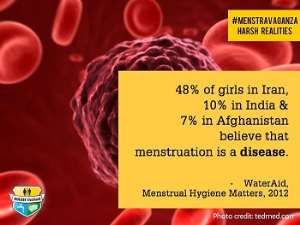
Is Menstruation a Disease?
Does hearing the word menstruation, cause you to frown or scowl your face as if it is something disguising and not worth mentioning in public? I am directing this question mostly to men. In this era, when science and technology has given us a very clear and vivid explanation to some of the mysteries of the human body, should people still be believing in these mysterious cultural norms and myths?
A report by waterAid on menstrual hygiene concluded that 48% of girls in Iran believe that menstruation is a disease. 10% in India and 7% in Afghanistan. It's shocking to me that, despite man's claim of advancement, so many people are still leaving in ignorance and absolute denial.
WASH-UNITED, a charitable organization focus on water, sanitation and Hygiene launched a campaign called MENSTRAVAGANZA this May. What interest me are some of their discoveries on menstrual hygiene. According to their official facebook page , it is only recently that girls in Malawi have access to sanitary pads.
And that the harsh reality is that ,many bathrooms in Rwandan primary schools are not gender-separated, nor are they equipped with doors that locks from the inside to ensure the privacy of menstruating girls. Whiles in India, the lack of sanitation facilities prevents an alarming number of girls from attending school during their period.
It will interest you to know that, there are a lot discusses going on concerning menstrual hygiene around the world today.
The waterAid report that there are various cultural and religious believes, social norms and myths on menstrual hygiene which are logically unbelievable. Why should women and girls be told that, during their menstrual cycle, they should not touch an animal cow (because it will become infertile), nor look in a mirror (because it will lose its brightness ) or touch a plant ( because it will die). Unbelievable.
In Ghana, I am aware of few of these practices that have been passed down to our people by our fore-fathers. I am personally aware of the traditional practices in the northern part of Ghana, where women in their menstrual periods are not allowed to cook, fetch water for visitors or their husbands. At this period, they are considered to be unclean. Because of these believes, it is so easy to find one man with many wives, to ensure that there is always a clean women to cook for him. Some communities even isolate the woman exposing here to health hazards. I am also aware of the fact, in the olden days when pad was not available in these villages, many of our mothers and grand mothers use cloth in place of pad. There is always a cloud of mysteries concept of menstruation in mentioned in these communities. Even today, many ladies go through a great deal to hide or dispose off their used pads. They will either go deep into the bush to bury them as they believe that, when a wicked people get hold of their used pads, the can use them for rituals.
But should we still have this misconception about menstrual cycle of our sisters, girlfriends, wives and mothers? Should we not be giving them the needed assistance and respect in order for them to keep to the highest level of hygienic practices. Do you think people will ever understand this natural and wonderful phenomena that happens to women at all?
Originating at researchlime.silvercrust.com




 2024 election: Don’t be scared; we're ready to maintain law and order – Dampare ...
2024 election: Don’t be scared; we're ready to maintain law and order – Dampare ...
 NDC to officially outdoor Prof Jane Naana as 2024 running mate on April 24
NDC to officially outdoor Prof Jane Naana as 2024 running mate on April 24
 Power outages: Always give 3 days prior notice — PURC to ECG
Power outages: Always give 3 days prior notice — PURC to ECG
 NDC's quest to wrestle power from NPP goes beyond partisanship; it’s a national ...
NDC's quest to wrestle power from NPP goes beyond partisanship; it’s a national ...
 ECG board members slapped GHS5.8 million fine by PURC for failing to alert publi...
ECG board members slapped GHS5.8 million fine by PURC for failing to alert publi...
 I never left NPP, they 'sacked' me for attending Alan's programme; even a $100mi...
I never left NPP, they 'sacked' me for attending Alan's programme; even a $100mi...
 Fuel prices go up today
Fuel prices go up today
 Anti-gay bill: Your stance serves no purpose; either you actively advocate for t...
Anti-gay bill: Your stance serves no purpose; either you actively advocate for t...
 Tension brews as NPP Seattle clashes with national leadership over parallel chap...
Tension brews as NPP Seattle clashes with national leadership over parallel chap...
 Anti-gay bill: You've done nothing in Ghana to prove you're against LGBTQ+; ther...
Anti-gay bill: You've done nothing in Ghana to prove you're against LGBTQ+; ther...
